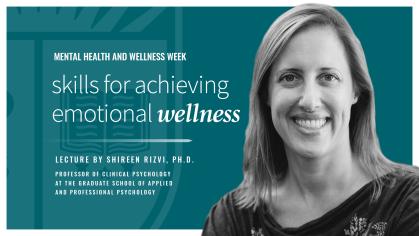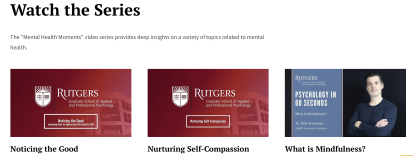
Physical wellness pertains to maintaining a healthy body through regular physical activity/movement, adequate sleep, healthy food choices, and avoiding unhelpful habits.

Welcome to Rutgers–New Brunswick
Whether you're a first-year student or well on the way to your degree, Rutgers is a big place with limitless possibilities. Click below to find handy tips to start your semester off right.
ScarletWell Wellness Resources
A Holistic Framework for Wellness
ScarletWell provides impactful programs, resources, and opportunities that support both wellness and well-being for students, faculty, and staff alike, based on the 8 Dimensions of Wellness model. The model provides a comprehensive framework for promoting mental health and success among college students, staff, and faculty by recognizing the various interconnected aspects of life. Below you can discover resources, practical tools, and insights designed to support your journey across the 8 Dimensions of Wellness.

Physical wellness pertains to maintaining a healthy body through regular physical activity/movement, adequate sleep, healthy food choices, and avoiding unhelpful habits.

Intellectual wellness focuses on lifelong learning, stimulating mental activities, and expanding knowledge and skills through education, creativity, and critical thinking.

Emotional wellness centers on understanding and managing emotions, coping with stress, building resilience, and fostering positive mental health.

Financial wellness encompasses managing finances effectively, budgeting, saving, and planning for future financial security.

Social wellness involves building and maintaining meaningful relationships, fostering a sense of belonging, and engaging in positive social interactions.

Spiritual wellness involves exploring personal beliefs, values, and purpose, finding meaning and inner peace, and connecting with something greater than oneself.

Occupational wellness emphasizes finding satisfaction and fulfillment in one's work, academic pursuits or volunteer work, balancing responsibilities, and striving for personal and professional growth.

Environmental wellness involves being and feeling physically safe, in safe and clean surroundings. It entails cultivating awareness and appreciation for the environment, promoting sustainability, and creating healthy living spaces.
Why It Matters
The 8 Dimensions of Wellness model is crucial for college students, staff, and faculty for several reasons:
• The 8 Dimensions of Wellness model provides a comprehensive framework for college students, staff, and faculty by recognizing the various interconnected aspects of life. Wellness is closely linked to academic performance, productivity, and career satisfaction. By prioritizing wellness, college students, staff, and faculty can pursue academic and career goals. Wellness is a framework to cultivate a positive organizational culture that supports the health of all members, leading to greater satisfaction, engagement, and connection.
• Social connections play essential roles in promoting student, staff, and faculty wellness by providing emotional support, fostering community, facilitating networking opportunities, and supporting professional development. ScarletWell strives to cultivate and nurture social connections.
The 8 Dimensions of Wellness model provides a comprehensive, holistic framework for promoting mental health and success among college students, staff, and faculty by recognizing the various interconnected aspects of life.
Physical Wellness

The physical dimension of wellness involves the maintenance of a healthy body, good physical health habits, good nutrition and exercise, and obtaining needed health care.
Resources
Intellectual Wellness

The intellectual dimension of wellness involves lifelong learning, applying what you learned, and sharing what you have learned.
Emotional Wellness

Emotional wellness is the ability to express feelings, engage in enjoyable activities and adjust to daily stress. It involves the ability and skills to express feelings, enjoy life, adjust to emotional challenges, cope with stress, and recover from traumatic life experiences. Emotional wellness centers on understanding and managing emotions, coping with stress, building resilience, and fostering positive mental health.
Resources
Counseling, Alcohol and Other Drug Assistance and Psychiatrics Services (CAPS) is available for students and provides informal drop-in and Let’s Talk gatherings as well as individual and group mental health and substance use treatment. CAPS also offers a wellness workshop series.
Rutgers Recovery Housing a 12-month, on-campus housing option that offers students the opportunity to have a fulfilling residential college experience living within a supportive community with other students in recovery.
Rutgers Offices of the Deans of Students provide integrated solutions, services, and support to enhance the student experience at Rutgers University–New Brunswick.
Wellness and Resiliency
Featuring a talk by Rutgers Psychologist Shireen Rizvi, PhD, this video from the Mental Health and Wellness Week Chancellor-Provost Lecture Series offers insights into becoming improving your overall emotional wellness.

The "Mental Health Moments" video series provides deep insights on a variety of topics related to mental health.

Financial Wellness

Financial wellness involves the ability to have enough money to meet practical needs and a sense of control over and knowledge about personal finances.
Building Financial Wellness helps you recognize what triggers spending, how using credit leads to debt, and ways to cope with challenging feelings about money. You can learn to set attainable financial goals to increase sense of control over personal finances.
Many free smartphone apps are funded through advertisements or require payment to access certain features, so check app reviews before downloading. Be cautious when using or signing up for web-based apps, especially if they require you to register. You can learn more about security when using apps from the website for the U. S. Federal Trade Commission.
More Resources
Social Wellness

Social wellness involves having relationships with friends, family, and the community, and having an interest in and concern for the needs of others.
Resources
Wellness and Self-Care Activities on Campus
Health Promotion and Peer Education
Reach Out and Connect with Someone
Spiritual Wellness

Spiritual wellness involves having meaning and purpose and a sense of balance and peace.
Resources
Faith and Spirituality Initiatives Office https://ruoffcampus.rutgers.edu/node/85
Faith Based Organizations, https://rutgers.campuslabs.com/engage/
Rev. Katrina Jenkins, Assistant Dean for Faith and Spirituality Initiatives, katrina.e.jenkins@rutgers.edu
Personal Values
Quiet Reflection
A Positive Attitude
Daily Gratitude Prompts
Occupational Wellness

Occupational wellness involves participating in activities that provide meaning and purpose, including employment.
Resources
Rutgers Career Exploration and Success
Rutgers Handshake to network and find jobs
Environmental Wellness

Environmental wellness involves being and feeling physically safe, in safe and clean surroundings, and being able to access clean air, food, and water. Consider where you live, like your neighborhood, community or workplace, as well as your country and planet.
Resources
